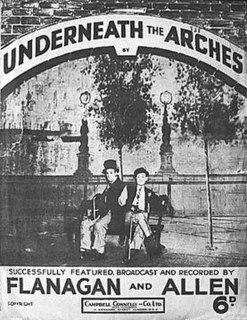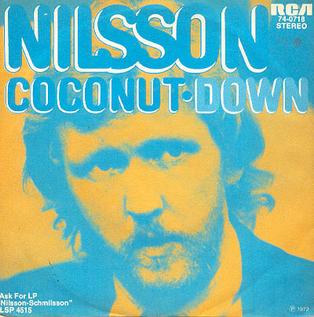Related Research Articles

Danny Kaye was an American actor, singer, dancer, comedian, musician, and philanthropist. His performances featured physical comedy, idiosyncratic pantomimes, and rapid-fire novelty songs.

The Andrews Sisters were an American close harmony singing group of the swing and boogie-woogie eras. The group consisted of three sisters: contralto LaVerne Sophia, soprano Maxene Anglyn, and mezzo-soprano Patricia Marie "Patty". The sisters have sold an estimated 90 million records. Their 1941 hit "Boogie Woogie Bugle Boy" can be considered an early example of rhythm and blues or jump blues. Other songs closely associated with the Andrews Sisters include their first major hit, "Bei Mir Bist Du Schön " (1937), "Beer Barrel Polka " (1939), "Beat Me Daddy, Eight to the Bar" (1940), "Don't Sit Under the Apple Tree " (1942), and "Rum and Coca Cola" (1945), which helped introduce American audiences to calypso.
"'A' You're Adorable" is a popular song with music by Sid Lippman and lyrics by Buddy Kaye and Fred Wise, published in 1948.
"Bibbidi-Bobbidi-Boo" is a novelty song, written in 1948 by Al Hoffman, Mack David, and Jerry Livingston. Introduced in the 1950 film Cinderella, and performed by actress Verna Felton, the song is about the Fairy Godmother transforming an orange pumpkin into a white carriage, four brown mice into white horses, a gray horse into a white-haired coachman, and a brown dog into a white-haired footman. The song was nominated for the Academy Award for Best Original Song in 1951 but lost out to "Mona Lisa" from Captain Carey, U.S.A. Disney used the song once again in their 2015 remake of Cinderella which starred Lily James in the leading role. The song was performed by Helena Bonham Carter, who plays Fairy Godmother, and was the final song of the movie, playing with the end credits. Bonham Carter's version can also be found as the 30th song on the original movie soundtrack.
"My Happiness" is a pop music standard which was initially made famous in the mid-twentieth century. An unpublished version of the melody with different lyrics was written by Borney Bergantine in 1933.
"You Can't Be True, Dear" is a popular song.
"Ac-Cent-Tchu-Ate the Positive" is a popular song which was published in 1944. The music was written by Harold Arlen and the lyrics by Johnny Mercer. The song was nominated for the "Academy Award for Best Original Song" at the 18th Academy Awards in 1945 after being used in the film Here Come the Waves. It is sung in the style of a sermon, and explains that accentuating the positive is key to happiness. In describing his inspiration for the lyric, Mercer told the Pop Chronicles radio documentary "[my] publicity agent ... went to hear Father Divine and he had a sermon and his subject was 'you got to accentuate the positive and eliminate the negative.' And I said 'Wow, that's a colorful phrase!'"
"Mule Train" is a popular song written by Johnny Lange, Hy Heath, Ramblin' Tommy Scott and Fred Glickman. It is a cowboy song, with the singer filling the role of an Old West wagon driver, spurring on his team of mules pulling a delivery wagon. As he goes about his work, the driver mentions the various mail-order goods he is delivering to far-flung customers. "Mule Train" was originally recorded by Ellis "Buz" Butler Jr. in 1947. Butler was the original writer of the song along with Fred Glickman. The original recording was released by Buz Butler on Decca Records.
"You Call Everybody Darlin'" is a popular song. The words and music were by Sam Martin (né Samuel Matzkowitz; 1908–2002), Ben Trace, and his brother, Al Trace, who used the pseudonym, Clem Watts. The song was copyrighted and published in 1946.

"Underneath the Arches" is a 1932 popular song with words and music by Bud Flanagan, and additional lyrics by Reg Connelly. It was one of the most famous songs of the duo Flanagan and Allen.

"Melody of Love" is a popular song. The music was originally written by Hans Engelmann in 1903. The lyrics were added by Tom Glazer in 1954.

"Coconut" is a novelty song written and first recorded by American singer-songwriter Harry Nilsson, released as the third single from his 1971 album, Nilsson Schmilsson. It was on the U.S. Billboard charts for 14 weeks, reaching #8, and was ranked by Billboard as the #66 song for 1972. It charted minorly in the UK, reaching #42. "Coconut" did best in Canada, where it peaked at #5. It was later featured in the films Reservoir Dogs, Practical Magic, and Hey Arnold!: The Movie.
"Lady of Spain" is a popular song composed in 1931 by Tolchard Evans with lyrics by "Erell Reaves", a pseudonym of Stanley J. Damerell and Robert Hargreaves, and by Henry Tilsley.
"I Can't Begin to Tell You" is a popular song with music written by James V. Monaco and lyrics by Mack Gordon. The song was published in 1945.
"Serenade of the Bells" is a popular song written by Kay Twomey, Al Goodhart, and Al Urbano and published in 1947.

"Near You" is a popular song written and originally recorded by Francis Craig and His Orchestra in 1947, with lyrics by Kermit Goell, that has gone on to become a pop standard.
"The Old Lamp-Lighter" is a popular song. The music was written by Nat Simon, the lyrics by Charles Tobias. The song was published in 1946. The lyrics sentimentalize and memorialize the profession of lamplighters, who walked city streets at dusk turning on the gas-powered streetlamps and turned them off again at dawn.
"Orange Colored Sky" is a popular song, written by Milton DeLugg and Willie Stein and published in 1950.
"That's My Desire" is a 1931 popular song with music by Helmy Kresa and lyrics by Carroll Loveday.
"Three Little Fishies", also known as "Three Little Fishes", is a 1939 song with words by Josephine Carringer and Bernice Idins and music by Saxie Dowell. The song tells the story of three fishes, who defy their mother's command of swimming only in a meadow, by swimming over a dam and on out to sea, where they encounter a shark, which the fish describe as a whale. They flee for their lives and return to the meadow in safety.
References
- ↑ p. 3 Shapiro, Eddie Nothing Like a Dame: Conversations with the Great Women of Musical Theatre Oxford University Press
- 1 2 3 4 5 Whitburn, Joel (1973). Top Pop Records 1940–1955. Record Research.
- ↑ http://www.aanitearkisto.fi
- ↑ Fallout FAQ at bethsoft.com